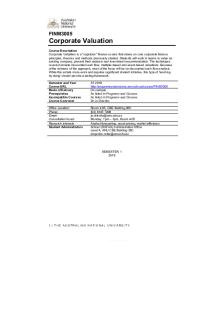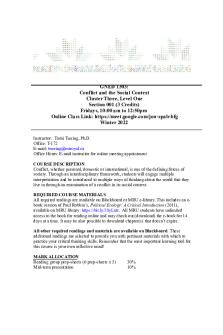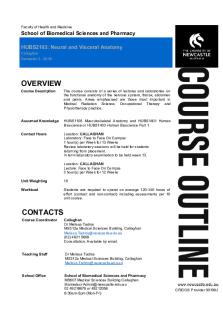HUBS3511 Sem 1 2022 Course Outline PDF

| Title | HUBS3511 Sem 1 2022 Course Outline |
|---|---|
| Course | Maternal and Foetal anatomy |
| Institution | University of Newcastle (Australia) |
| Pages | 5 |
| File Size | 276 KB |
| File Type | |
| Total Downloads | 16 |
| Total Views | 147 |
Summary
Detailed and comprehensive course outline.
Hubs2022 Sem 1...
Description
School of Biomedical Sciences and Pharmacy HUBS3511: Human Reproduction and Pregnancy Online Semester 1 - 2022
OVERVIEW Course Description
This course explores the biology and physiology of reproduction and pregnancy, encompassing how sperm and eggs are made; the events that result in fertilisation and conception; and how a baby develops and is born. The course will focus only on human reproduction.
Assumed Knowledge
HUBS1403 and HUBS1404 – content relating to reproductive hormones and the menstrual cycle
Contact Hours
Online Online Activity Online 1 hour(s) per Week for 13 Weeks Self-Directed Learning Online 3 hour(s) per Week for 12 Weeks
Unit Weighting
10
Workload
Students are required to spend on average 120-140 hours of effort (contact and non-contact) including assessments per 10 unit course.
CONTACTS Course Coordinator
Callaghan Assoc Professor Kirsty Pringle - HMRI [email protected] (02) 4042 0372 Consultation: appointment by email
Teaching Staff
Dr Jessie Sutherland [email protected] Dr Sarah Delforce [email protected] Dr Emmalee Ford [email protected] Dr Joshua Fisher [email protected] Dr Jonathan Paul [email protected]
School Office
School of Biomedical Sciences and Pharmacy MS607 Medical Sciences Building Callaghan [email protected] 02 49218679 or 49212058 8:30am-5pm (Mon-Fri) CRICOS Provider 00109J
HUBS3511: Human Reproduction and Pregnancy Online Semester 1 - 2022
SYLLABUS Course Content
1. 2. 3. 4. 5. 6. 7. 8. 9. 10.
The basics of reproduction Conception and embryonic development Reproductive disorders and diseases Contraception and Assisted Reproductive Technologies Fetal development Placental and fetal membrane function Maternal physiology during pregnancy Birth & Pregnancy complications Neonatal physiology Technological advances in reproductive medicine
Course Learning Outcomes
On successful completion of this course, students will be able to: 1. Demonstrate an in-depth understanding of the basics of reproduction including: conception, contraception, and fetal development 2. Compare male and female reproductive development in humans and describe the maturation process of both male and female gametes from early embryonic development to puberty 3. Outline the placental development and function 4. Describe the endocrinology of reproduction and pregnancy 5. Describe factors limiting human fertility, and how they can be overcome 6. Discuss a variety of diseases affecting human reproductive health and development 7. Describe the stages of labour and discuss birth-related complications 8. Discuss factors contributing to abnormal fetal development 9. Describe and apply biomedical perspectives related to fertility, pregnancy, birth and perinatology including an awareness of the latest technological advances 10. Examine and critique current research findings relating to the topics covered in this course 11. Convey complex biomedical information using language that an average nonprofessional can understand
Course Materials
There is no set textbook, recommended texts are: Human Reproductive Biology, by Jones and Lopez Maternal, Fetal and Neonatal Physiology, by Blackburn Links will be provided on CANVAS for additional readings
Page 2 of 5
HUBS3511: Human Reproduction and Pregnancy Online Semester 1 - 2022
ASSESSMENTS This course has 3 assessments. Each assessment is described in more detail in the sections below. Assessment Name 1 Assignment 1: Educational Resource 2 Online Test x 6 3 Formal Examination Late Submissions
Due Date
Involvement
Weighting
Friday 8th April
Individual
40%
Learning Outcomes 1, 11
Friday, weeks 3, 5, 7, 9, 11, 13 Formal examination period
Individual
10%
1-9
Individual
50%
1-11
The mark for an assessment item submitted after the designated time on the due date, without an approved extension of time, will be reduced by 10% of the possible maximum mark for that assessment item for each day or part day that the assessment item is late. Note: this applies equally to week and weekend days.
Assessment 1 – Assignment 1: Educational Resource Assessment Type Description Weighting Due Date Submission Method Assessment Criteria Return Method Feedback Provided
Written Assignment: Development of an Educational Resource You are required to develop an educational resource: info sheet, video, etc. to convey information relating to modules 1-6. 40% Friday 8th April, 5pm Online directly to CANVAS site Available on CANVAS N/A Marks uploaded to CANVAS site
Assessment 2 - Online Test x 6 Assessment Type Weighting Due Date Submission Method Assessment Criteria Return Method Feedback Provided
Quiz x 6 10% (2% each, best 5 scores will be used) Friday, 5pm on weeks 3, 5, 7, 9, 11, 13 Online via CANVAS There will be 6 online quizzes with a mix of short answer and multiple choice questions to consolidate your knowledge of the previous 2 modules. Scores available at close of quiz Marks uploaded to CANVAS site
Assessment 3 - Formal Examination Assessment Type Weighting Due Date Assessment Criteria
Return Method
Formal Examination 50% In formal exam period This is a CLOSED BOOK examination and no notes are permitted. You are required to complete a formal exam on campus during the examination period at the end of semester. The exam will include content from the entire course and has been designed to assess your knowledge of all learning outcomes. N/A
Page 3 of 5
HUBS3511: Human Reproduction and Pregnancy Online Semester 1 - 2022
ADDITIONAL INFORMATION Grading Scheme
This course is graded as follows: Range of Grade Description Marks 85-100
High Distinction (HD)
75-84
Distinction (D)
65-74
Credit (C)
50-64
Pass (P)
0-49
Fail (FF)
Outstanding standard indicating comprehensive knowledge and understanding of the relevant materials; demonstration of an outstanding level of academic achievement; mastery of skills*; and achievement of all assessment objectives. Excellent standard indicating a very high level of knowledge and understanding of the relevant materials; demonstration of a very high level of academic ability; sound development of skills*; and achievement of all assessment objectives. Good standard indicating a high level of knowledge and understanding of the relevant materials; demonstration of a high level of academic achievement; reasonable development of skills*; and achievement of all learning outcomes. Satisfactory standard indicating an adequate knowledge and understanding of the relevant materials; demonstration of an adequate level of academic achievement; satisfactory development of skills*; and achievement of all learning outcomes. Failure to satisfactorily achieve learning outcomes. If all compulsory course components are not completed the mark will be zero. A fail grade may also be awarded following disciplinary action.
*Skills are those identified for the purposes of assessment task(s). Communication Methods
Communication methods used in this course include: Email and CANVAS
Course Evaluation
Each year feedback is sought from students and other stakeholders about the courses offered in the University for the purposes of identifying areas of excellence and potential improvement.
Oral Interviews
As part of the evaluation process of any assessment item in this course an oral examination may be conducted. The purpose of the oral examination is to verify the authorship of the material submitted in response to the assessment task. The oral examination will be conducted in accordance with the principles set out in the Oral Examination Guidelines. In cases where the oral examination reveals the assessment item may not be the student's own work the case will be dealt with under the Student Conduct Rule.
Academic Misconduct
All students are required to meet the academic integrity standards of the University. These standards reinforce the importance of integrity and honesty in an academic environment. Academic Integrity policies apply to all students of the University in all modes of study and in all locations. For the Student Academic Integrity Policy, refer to https://policies.newcastle.edu.au/document/view-current.php?id=35.
Adverse Circumstances
You are entitled to apply for special consideration because adverse circumstances have had an impact on your performance in an assessment item. This includes applying for an extension of time to complete an assessment item. Prior to applying you must refer to the Adverse Circumstances Affecting Assessment Items Procedure, available at https://policies.newcastle.edu.au/document/view-current.php?id=236. All applications for Adverse Circumstances must be lodged via the online Adverse Circumstances system, along with supporting documentation.
Important Policy Information
The 'HELP for Students' tab in UoNline contains important information that all students should be familiar with, including various systems, policies and procedures.
Page 4 of 5
HUBS3511: Human Reproduction and Pregnancy Online Semester 1 - 2022
Weekly Topics All content for this course will be available on CANVAS to read/watch in the relevant week. Week 1
Module 1: Basics of Reproduction I
Week 2
Module 2: Basics of Reproduction II
Week 3
Module 3: Basics of Reproduction III
Week 4
Module 4: Conception
Week 5
Module 5: Reproductive Disorders and Diseases
Week 6
Module 6: Infertility and Assisted Reproduction
Week 7
Module 7: The Fetal Period
Week 8
Module 8: Placental Development and Function
Week 9
Module 9: Maternal Physiology
Week 10
Module 10: Pregnancy Complications and Labour
Week 11
Module 11: Neonatal Physiology
Week 12
Module 12: Technological advances Formal Exam Period JUNE 6 - JUNE 18 Rescheduled Exam Period TBA
Please note that all students are expected to be available during BOTH formal and rescheduled exam periods. In the event that you require an approved rescheduled exam, this will be held in the rescheduled exam period. If you have made plans to travel or work during that period, you will not be offered another opportunity to sit the examination.
COURSE SCHEDULE There will be an online zoom lecture/tutorial each week to go over the previous weeks course content. Links to the lectures will be available on CANVAS. Week 1 2 3 4 5 6 7
Date 22 Feb 1 Mar 8 Mar 15 Mar 22 Mar 29 Mar 5 Apr
Day Tue Tue Tue Tue Tue Tue Tue
8 9 10 11 12 13
26 Apr 3 May 10 May 17 May 24 May 31 May
Tue Tue Tue Tue Tue Tue
Time Topic 1pm Introduction to the Course 1pm Basics of Reproduction I 1pm Basics of Reproduction II 1pm Basics of Reproduction III 1pm Conception 1pm Reproductive Disorders and Diseases 1pm Infertility and Assisted Reproduction Semester 1 Recess (11th – 25th April) 1pm The Fetal Period 1pm Placental Development and Function 1pm Maternal Physiology 1pm Pregnancy Complications and Labour 1pm Neonatal Physiology 1pm Technological advances/Revision
Lecturer Kirsty Pringle Jessie Sutherland Sarah Delforce Emmalee Ford Emmalee Ford Kirsty Pringle Jessie Sutherland Kirsty Pringle Sarah Delforce Joshua Fisher Jonathan Paul Joshua Fisher Kirsty Pringle
This course outline was approved by the Head of School. No alteration of this course outline is permitted without Head of School approval. If a change is approved, students will be notified and an amended course outline will be provided in the same manner as the original. © 2022 The University of Newcastle, Australia
Page 5 of 5...
Similar Free PDFs

COURSE OUTLINE WINTER 2022
- 12 Pages

ELEC3115 2022 T1 - Course Outline
- 16 Pages

HUMS1012 2022 Summer Course Outline
- 10 Pages

FMGT 4410 Winter 2022 Course Outline
- 15 Pages

Course outline-1
- 5 Pages
Popular Institutions
- Tinajero National High School - Annex
- Politeknik Caltex Riau
- Yokohama City University
- SGT University
- University of Al-Qadisiyah
- Divine Word College of Vigan
- Techniek College Rotterdam
- Universidade de Santiago
- Universiti Teknologi MARA Cawangan Johor Kampus Pasir Gudang
- Poltekkes Kemenkes Yogyakarta
- Baguio City National High School
- Colegio san marcos
- preparatoria uno
- Centro de Bachillerato Tecnológico Industrial y de Servicios No. 107
- Dalian Maritime University
- Quang Trung Secondary School
- Colegio Tecnológico en Informática
- Corporación Regional de Educación Superior
- Grupo CEDVA
- Dar Al Uloom University
- Centro de Estudios Preuniversitarios de la Universidad Nacional de Ingeniería
- 上智大学
- Aakash International School, Nuna Majara
- San Felipe Neri Catholic School
- Kang Chiao International School - New Taipei City
- Misamis Occidental National High School
- Institución Educativa Escuela Normal Juan Ladrilleros
- Kolehiyo ng Pantukan
- Batanes State College
- Instituto Continental
- Sekolah Menengah Kejuruan Kesehatan Kaltara (Tarakan)
- Colegio de La Inmaculada Concepcion - Cebu










